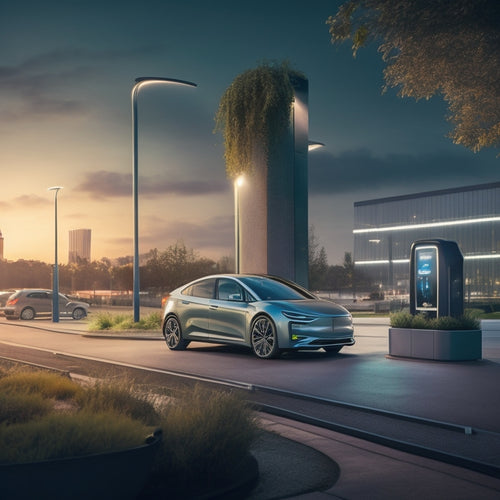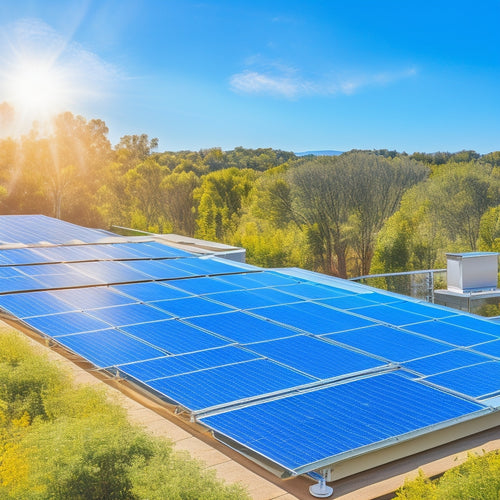
Small House Solar System
Share
With a small house solar system, you can utilize free energy daily, reducing your carbon footprint markedly. You'll need high-efficiency solar panels, with ratings above 20%, to optimize energy output. Before installation, evaluate your energy demands by calculating your daily energy usage and identifying appliances with high energy ratings. By doing so, you'll determine the required solar panel capacity and battery storage for your system. To guarantee peak performance, it's essential to contemplate energy management strategies, such as load shifting and peak shaving. Now, get ready to take the first step towards energy independence, and uncover how to make the most of your small house solar system.
The Essentials
- A small house solar system can achieve energy independence and reduce reliance on the grid with a well-designed and optimized solar panel array.
- High-efficiency solar panels with ratings above 20% are crucial for maximizing energy output and reducing the required panel capacity.
- Accurate assessment of daily energy usage and appliance energy ratings is essential for determining the required solar panel capacity and battery storage.
- Effective energy management through smart energy strategies like load shifting and peak shaving can maximize system efficiency and reduce energy costs.
- A balanced consideration of panel efficiency ratings, installation costs, and battery storage capacity is necessary for a cost-effective and efficient small house solar system.
Harness Free Energy Daily
You'll be utilizing free energy daily by leveraging the power of solar radiation.
With solar panels, you can generate clean and sustainable energy, reducing your reliance on the grid and lowering your energy bills Renewable Energy Systems.
Your small house solar system will capture this energy through photovoltaic panels, converting it into electrical energy to power your home.
Daily Energy Harvesting
Most days, your small house solar system can capture a significant amount of free energy from the sun. However, it's essential to guarantee you're collecting energy efficiently to power your daily needs.
Effective daily energy collection relies on proper energy management and system optimization. With a reliable Residential Energy Storage Systems in place, you can store excess energy generated by your solar panels and use it during off-peak hours or emergencies.
You'll want to monitor your energy production and consumption in real-time to identify opportunities for improvement. This involves tracking your system's performance, adjusting your energy usage patterns, and making adjustments to your system's configuration as needed. By doing so, you can maximize your energy yield and minimize energy waste.
Optimizing your system involves verifying that your solar panels are clean and well-maintained, your inverters are functioning correctly, and your battery bank is properly sized and configured.
Additionally, you should consider implementing smart energy management strategies, such as load shifting and peak shaving, to further optimize your energy usage. By taking these steps, you can utilize the full potential of your small house solar system and enjoy a reliable, sustainable source of energy.
Solar Power Solutions
By capitalizing on the free energy available daily, you can greatly reduce your reliance on the grid and lower your energy bills. Solar power solutions offer a cleaner, more sustainable way to generate electricity for your small house. With the right system, you can enjoy energy independence and take advantage of solar incentives.
Here is a breakdown of the benefits of solar power solutions:
| Benefit | Description |
|---|---|
| Energy Independence | Reduce reliance on the grid and generate your own electricity |
| Lower Energy Bills | Save money on your energy bills with free energy from the sun |
| Environmental Benefits | Reduce your carbon footprint and contribute to a cleaner environment |
| Increased Property Value | Enhance your property value with a solar power system installation |
| Government Incentives | Take advantage of solar incentives and tax credits for installing a solar power system |
Reduces Carbon Footprint Significantly
You can greatly reduce your carbon footprint by switching to a small house solar system, which generates zero-emission energy and relies on a renewable power source.
By installing photovoltaic cells on your roof, you can capture the energy from the sun and convert it into electricity, reducing your reliance on traditional energy sources.
This means you'll no longer be contributing to greenhouse gas emissions, a major contributor to climate change.
Zero Emission Energy
As homeowners, we're constantly seeking ways to reduce our carbon footprint, and one essential step in achieving this goal is by utilizing zero emission energy.
By adopting zero emission energy, you're taking a considerable step towards minimizing your environmental impact. This approach involves capturing energy from sources that produce little to no greenhouse gas emissions, thereby reducing your carbon footprint considerably.
Zero emission energy is a fundamental component of sustainable practices, enabling you to break free from reliance on fossil fuels and achieve energy independence.
By investing in a small house solar system, you're not only reducing your carbon footprint but also decreasing your energy bills.
With zero emission energy, you're in control of your energy consumption, allowing you to make conscious choices about your environmental impact.
Renewable Power Source
Solar power, a clean and sustainable renewable energy source, reduces carbon footprint considerably by utilizing energy from the sun. As you consider a small house solar system, you're likely drawn to the solar energy benefits that come with it. By capturing the sun's energy, you'll markedly decrease your reliance on fossil fuels, resulting in a substantial reduction in greenhouse gas emissions.
This shift towards sustainable living not only benefits the environment but also provides you with energy independence.
As a renewable power source, solar energy is an attractive option for those seeking freedom from the grid. With a small house solar system, you can generate your own electricity, reducing your reliance on public utilities.
This decentralized approach to energy production allows you to take control of your energy needs, ensuring a sustainable future. By adopting solar power, you'll be contributing to a cleaner, healthier environment while enjoying the benefits of reduced energy costs and increased energy security.
High-Efficiency Solar Panels
You'll want to evaluate high-efficiency solar panels that boast high panel efficiency ratings, typically above 20%, to maximize your small house solar system's energy production.
When choosing the best solar panel brands, look for top ranked high efficiency solar panels that offer maximum energy output.
These panels' max power output is also vital, as it directly affects the amount of electricity generated.
Panel Efficiency Ratings
Within the domain of high-efficiency solar panels, panel efficiency ratings play an imperative role in determining the overall performance of a solar system. You'll find that panel efficiency is measured by its ability to convert sunlight into electrical energy. The higher the rating, the more energy your solar system will produce per unit area.
When evaluating panel efficiency ratings, you'll come across different panel types, each with its own strengths and weaknesses. Monocrystalline panels, for instance, boast higher efficiency ratings than polycrystalline panels but come at a higher cost.
Bifacial panels, on the other hand, can capture energy from both the front and back sides, increasing overall efficiency.
When considering panel efficiency ratings, it's essential to weigh them against installation costs. While high-efficiency panels may seem like the obvious choice, they can be prohibitively expensive.
You'll need to balance the increased energy output with the added upfront cost. By carefully evaluating panel efficiency ratings and installation costs, you can make an informed decision that meets your energy needs and budget constraints.
Max Power Output
High-efficiency solar panels are designed to maximize energy production, and their max power output is a critical factor in determining their overall performance. You'll want to evaluate panels with high max power output ratings to guarantee you're generating as much energy as possible from your small house solar system.
Max power output is typically measured in watts (W) and represents the maximum amount of power a solar panel can produce under ideal conditions. When selecting solar panels, you should assess factors like panel orientation and solar tracking to optimize energy production. Here's a comparison of three high-efficiency solar panels with varying max power output ratings:
| Panel Model | Max Power Output (W) | Efficiency (%) |
|---|---|---|
| Panasonic HIT-240 | 240 | 21.8 |
| LG NeON 2 | 330 | 20.5 |
| SunPower X-Series | 370 | 22.2 |
Assess Your Energy Demands
You need to calculate your daily energy usage to determine the size of the solar system required for your small house.
To do this, you'll want to identify the appliances you'll be using and their energy ratings, which are usually listed in watts (W) or kilowatts (kW).
When selecting a solar battery, consider reliable energy storage options, such as deep cycle solar batteries, to guarantee a consistent power supply.
Daily Energy Usage
Your daily energy usage is the vital factor in determining the size and type of solar system required to power your small house. To accurately assess your energy demands, you'll need to calculate your daily energy usage in watt-hours (Wh). This involves tracking your energy consumption over a period of time, typically a week or a month.
Start by identifying the appliances and devices you use daily, and their respective power ratings. Implementing energy conservation tips, such as turning off lights and electronics when not in use, can greatly reduce your energy consumption.
Consider smart home integration to automate energy-saving practices and optimize your energy usage. By doing so, you can reduce your reliance on the grid and lower your energy bills.
Accurate calculation of your daily energy usage will enable you to determine the required solar panel capacity, inverter size, and battery storage needed for a reliable and efficient solar system. This essential step will guarantee your small house solar system meets your energy needs while providing you with the freedom and independence you desire.
Appliance Energy Ratings
Approximately 20-30 appliances and devices in a small house consume a considerable amount of energy daily. To assess your energy demands accurately, it's crucial to evaluate the energy efficiency of each appliance. You can do this by checking their energy labeling, which provides important information on their power consumption.
Look for appliances with high energy efficiency ratings, such as the ENERGY STAR label in the US. This label indicates that the appliance meets energy efficiency standards set by the U.S. Environmental Protection Agency. You can also check the appliance's EnergyGuide label, which provides an estimate of its energy consumption and compares it to similar products.
When selecting appliances, prioritize those with high appliance efficiency. For instance, choose LED bulbs over incandescent bulbs, as they consume considerably less energy while providing similar brightness.
Similarly, opt for energy-efficient refrigerators, washing machines, and air conditioners. By doing so, you'll reduce your overall energy consumption, making it easier to power your small house with a solar system.
Longer Battery Life Guaranteed
You'll want to focus on the power storage capacity of your solar system's batteries to guarantee a longer battery life.
This means selecting batteries with a high ampere-hour (Ah) rating, which measures the amount of electric charge a battery can hold.
Power Storage Capacity
When it comes to guaranteeing a steady supply of energy in your small house solar system, power storage capacity plays an essential role, especially during periods of low sunlight or power outages.
You'll want to evaluate the right battery types and storage solutions to meet your energy needs. Effective energy management is key to maximizing your system's efficiency and minimizing peak demand.
With a well-designed power storage system, you can achieve greater grid independence and reduce your reliance on the utility grid.
When assessing power storage options, think about the installation costs and long-term maintenance tips to secure ideal performance.
Load balancing and system integration are also vital to guarantee seamless energy distribution.
As you investigate different storage solutions, look for future technologies that can enhance your system's performance and extend its lifespan.
Frequently Asked Questions
Can I Install Solar Panels on My Existing Roof?
You can install solar panels on your existing roof if it's structurally sound and receives sufficient sunlight, but you'll need to assess roof suitability and obtain necessary installation permits before commencing the project.
Are Small House Solar Systems Compatible With Grid Power?
As you steer through the intersection of freedom and energy, you'll find that grid-compatible systems, like yours, can harmoniously coexist with grid power, leveraging grid connection and energy storage to enable your independence.
Do Solar Panels Work During Power Outages?
When the grid goes down, you'll want to know if your solar panels still generate power. Unfortunately, standard solar panel functionality shuts down during power outages for safety reasons, but there are solutions, like battery backup systems, that can keep you energized when you need it most.
How Often Should I Clean My Solar Panels for Optimal Performance?
You should clean your solar panels every 6-12 months, depending on local pollution and debris, to maintain ideal performance; regular cleaning, along with inspecting for damage and loose connections, guarantees maximum energy output and prolongs system lifespan.
Are Small House Solar Systems Eligible for Government Incentives?
When you invest in solar, you're buying freedom from utility bills; now, can you cash in on government incentives too? Yes, you're eligible for federal tax credits and local rebates, which can cover up to 30% of your system's cost.
Final Thoughts
You'll be generating an astonishing amount of free energy daily, slashing your carbon footprint to nearly zero! With high-efficiency solar panels, you'll be utilizing power like a pro. By evaluating your energy demands, you'll be ensuring a seamless switch to renewable energy. And, with our guaranteed longer battery life, you'll have a reliable backup for those unexpected outages. Get ready to bid farewell to hefty energy bills and hello to a sustainable future - the possibilities are endless with your small house solar system!
Related Posts
-

Solid State Batteries in Electric Vehicles
Solid-state batteries revolutionize electric vehicles by offering a longer lifespan and higher energy density than tr...
-

What Types of Solar Energy Devices Are Available
You'll find several types of solar energy devices available today, each customized to different energy needs. Photovo...
-

Replacing Old Appliances With Sustainable Alternatives
Replacing old appliances with sustainable alternatives can change your home into an energy-efficient space. Not only ...


